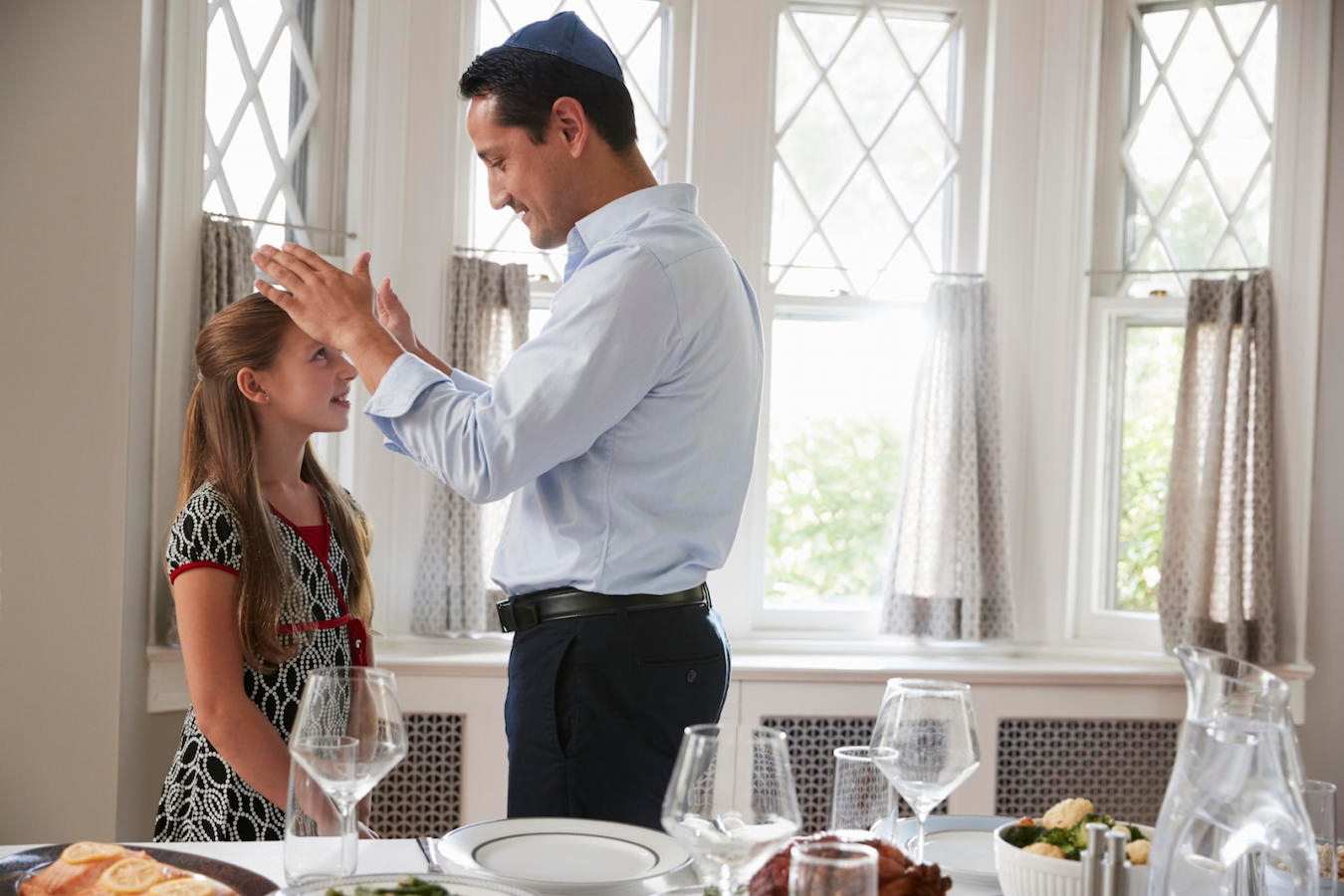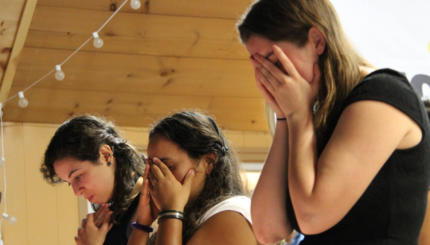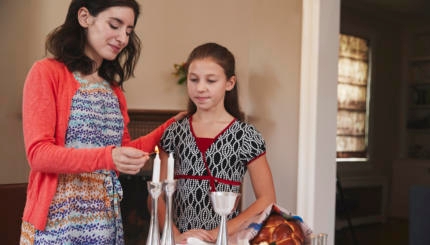Many Jewish parents embrace the custom of blessing their children on Friday evening. This custom is a nice way of bringing gratitude and spirituality into your family. On Shabbat and at other special occasions, it can contribute to a special feeling of closeness between you and your children.
The words of the blessing are taken from the priestly blessing (Numbers 6:24-26) and the introduction is altered depending on whether the child being blessed is a boy or girl.
For boys, the introductory line is:
May you be like Ephraim and Menashe.
יְשִׂימְךָ אֱלֹהיִם כְּאֶפְרַיְם וְכִמְנַשֶּׁה
Yesimcha Elohim k’Ephraim v’chi-Menashe.
With your help, My Jewish Learning can provide endless opportunities for learning, connection and discovery.
For girls, the introductory line is:
May you be like Sarah, Rebecca, Rachel, and Leah.
יְשִׂימֵךְ אֱלֹהיִם כְּשָׂרָה רִבְקָה רָחֵל וְלֵאָה
Yesimech Elohim k’Sarah Rivka Rachel v’Leah
For both boys and girls, the rest of the blessing is:
May God bless you and protect you.
יְבָרֶכְךָ יְהוָה וְיִשְׁמְרֶךָ
Yivarechecha Adonai v’yishmerecha
May God show you favor and be gracious to you.
יָאֵר יְהוָה פָּנָיו אֵלֶיךָ וִיחֻנֶּךָּ
Ya’er Adonai panav eilecha vichuneka
May God show you kindness and grant you peace.
יִשָּׂא יְהוָה פָּנָיו אֵלֶיךָ וְיָשֵׂם לְךָ שָׁלום
Yisa Adonai panav eilecha v’yasem lecha shalom
The blessing is performed differently in every family. In some traditional homes, only the father blesses the children. In other families, both parents give blessings–either together and in unison, or first one parent, followed by the other. In some homes the mother blesses the girls and the father blesses the boys.
Usually the person giving the blessing places one or both hands on the child’s head. Some parents bless each child in succession, working from oldest to youngest. Others bless all of the girls together, and all of the boys together.
After the blessing, some parents take a moment to whisper something to their child–praising him or her for something he or she did during the week, or conveying some extra encouragement and love. Almost every family concludes the blessing with a kiss or a hug.
There are also different customs as to when the blessing is recited. Some families bless their children immediately before or after Kiddush. Others prefer to bless just after lighting the Shabbat candles. In some families with grown children who no longer live at home, this blessing is imparted over the phone on Fridays.
Why Ephraim and Menashe?
It seems strange that the blessing for boys singles out Ephraim and Menashe instead of the patriarchs, Abraham, Isaac, and Jacob — or, for that matter, any other great biblical leaders who were men (Joseph, Moses, King David, King Solomon). A few answers have been proposed.
The view most commonly held is that of contemporary Israeli Rabbi Mordechai Elon who wrote that Ephraim and Menashe are the first pair of brothers in the Bible who do not see each other as competitors. They do not struggle for power, and their dynamic as a family never seems to be the source of great difficulty in either of their lives. By blessing our children to be like Ephraim and Menashe we seek to bestow upon our children the legacy of peace and harmony between brothers.
Another interpretation, by 19th-century Israeli Rabbi Shmuel Hominer, notes that Ephraim and Menashe grew up in Egypt, unlike the patriarchs who all grew up in Israel. Ephraim and Menashe maintained their distinct identity as Israelites, even though they lived in a place where they were surrounded and outnumbered by the Egyptians and their gods. The ability to remain faithful to Judaism, even when it is a struggle, is a legacy that we want to pass on to our children.
Special Occasions
Beyond the weekly blessing on Friday nights, many parents recite this blessing on special occasions, such as at a child’s brit milah or naming ceremony, bar or bat mitzvah, and wedding. Any important milestone in a child’s life, from the first day of school to birthdays, to the day they graduate high school or college, can be appropriately marked with this blessing.
Sign up for My Jewish Learning’s RECHARGE, a weekly email with a collection of Shabbat readings and more to enhance your day of rest experience.
brit milah
Pronounced: breet mee-LAH, Origin: Hebrew, literally "covenant of circumcision," the Jewish circumcision ceremony for an 8-day-old boy, marking the covenant between God and the Jews. Also known as a bris.
Shabbat
Pronounced: shuh-BAHT or shah-BAHT, Origin: Hebrew, the Sabbath, from sundown Friday to sundown Saturday.



